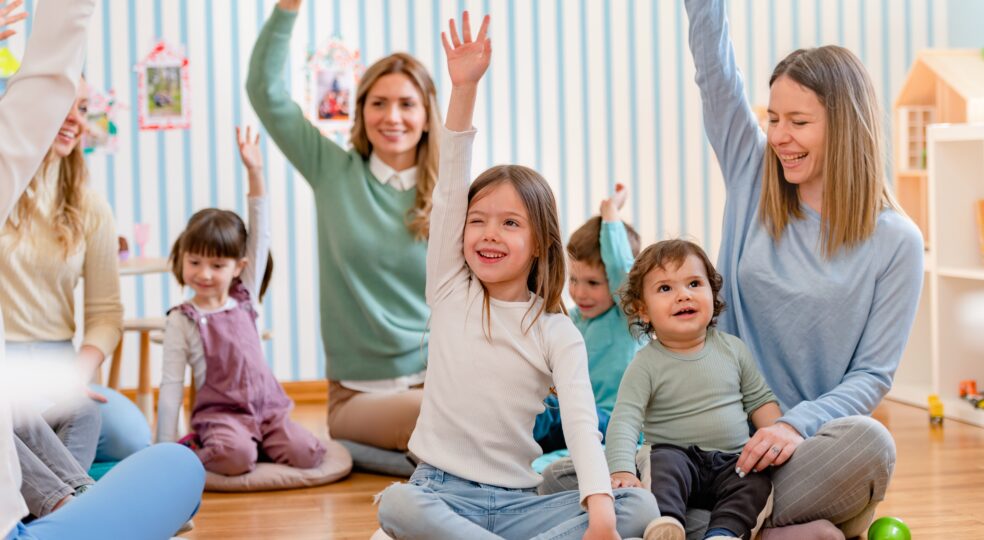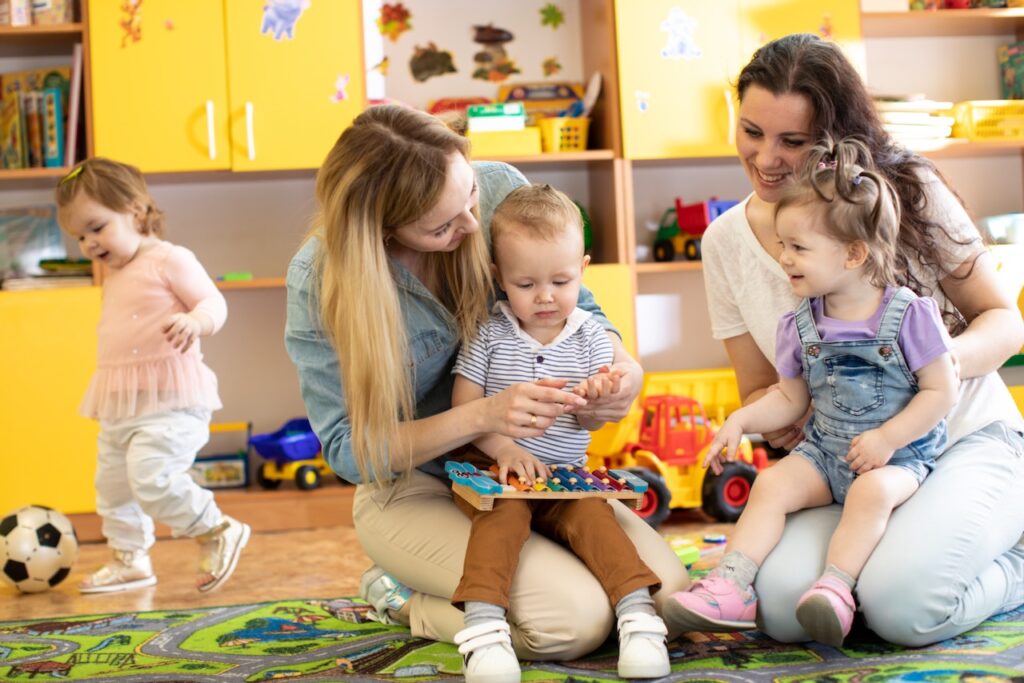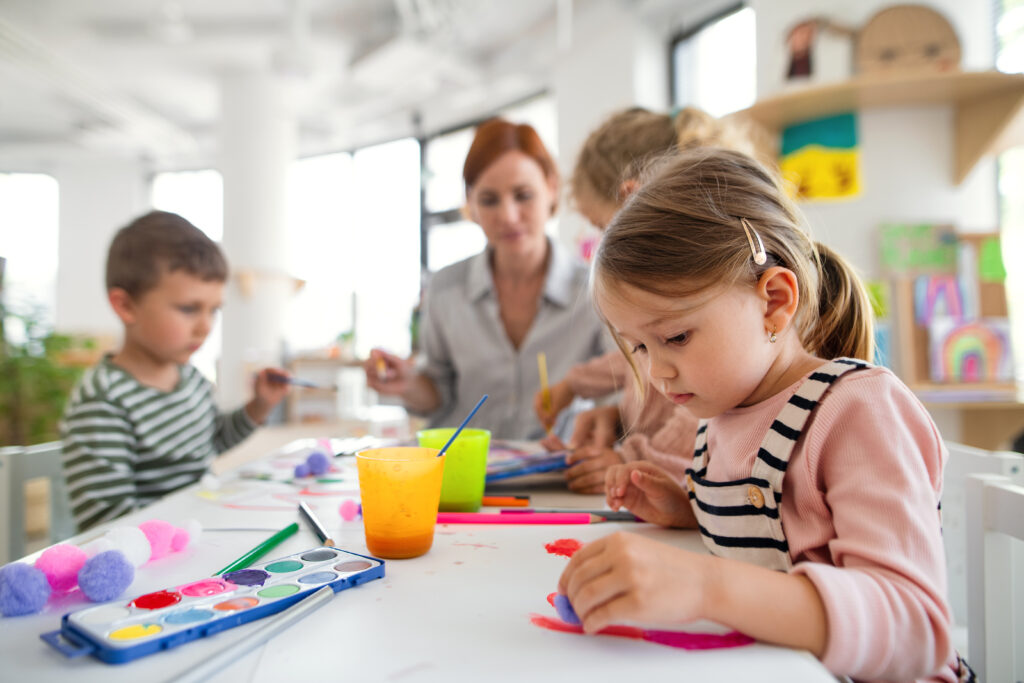
The home environment is not the only place, and parents are not the only (reference) persons who shape a child's development. Valuable experiences are also gained in kindergarten or at school. However, it sometimes happens that the pedagogical values at home and in the educational institution do not conform. The concept of educational partnership is intended to remedy this.
But what exactly is meant by this and how can this concept be implemented? What are the special features that need to be taken into account? We would like to inform you about this in detail below.
An educational partnership is a concept that describes the cooperation between parents and educators. The focus is on the joint responsibility for the education and upbringing of a child. Communication and dialogue between all parties involved form the basis here, so that the child does not experience any discrepancies.
The goal of the educational partnership is to support the children in the best possible way. This applies all the more to children from disadvantaged backgrounds. The concept of educational partnership has replaced conventional parental work in the elementary sector. However, the concept is not entirely uncontroversial, which we will discuss in more detail in a separate section.
In summary, the educational partnership describes a modern relationship between educational professionals in educational institutions and parents, which ideally is characterized by Readiness for dialogue, Communication and Cooperation at eye level, Respect and Trust should be characterized. Parents continue to be regarded as attachment and caregivers, but are supported in their parenting skills, as it were.
The educational partnership is based to a large extent on the components of classic parental work, but in an expanded form. The work with parents includes both individual discussions with parents about their child and a joint exchange with all parents concerning the situations as well as possibilities for improvement in the educational institution.
In individual work, where the focus is on an intensive exchange of information about the child's developmental status, the following methods can be used, for example:
The following options are possible and useful in the context of community exchange:
As you can see, an educational partnership is not a completely new concept in terms of the forms it takes. Well-tried methods of parental work are retained. The main difference is the sensitivity to the individual needs of parents. Needs of parents and children. The forms of implementation are designed according to need.

As already explained, the educational partnership focuses on the child as an individual. Each child should not only receive the best possible support, but also grow up in an emotionally stable environment. Accordingly, the measures and actions listed above are intended to achieve the following sub-goals:
As already mentioned, the educational partnership has largely replaced parental work in German educational institutions. But what is actually the difference between these two concepts? In order to understand the meaningfulness of the educational partnership, it is important to clarify the distinction from pure parental work.
As the term suggests, parent work is not done together with the parents, but on the parents. The educators point out possible parenting mistakes and try to guide them to correct them. The exchange does not take place at eye level, but the educators see themselves as experts.
Example: A kindergarten teacher observes that a mother is still taking her three-year-old child to kindergarten in a buggy instead of letting him walk the few meters. She speaks to the mother in a friendly, yet reprimanding tone. She says that she would rather let the child walk, as this would certainly be beneficial to its motor development.
Within the framework of the educational partnership, the educator would enter into an exchange with the mother instead of immediately making a concrete suggestion for improvement. She would inquire about the motives and put herself in the mother's perspective. There may be a plausible reason why she handles the journey in this particular way.
The educational partnership goes far beyond "informing" parents about their child's behavior and development. From the point of view of educational policy, the following reasons in particular speak for the further developed concept of parental work:
Whether children in the German education system successful depend to a large extent on the support they receive at home. However, not all parents are in a position to provide the necessary support. This is the case, for example, if there are language barriers due to migration or if the parents themselves have educational gaps due to a lack of support in childhood.
As a result of these findings, which are based on the first PISA study in 2001, the elementary sector has been upgraded in Germany. This means that children should be supported outside the home as early as possible so that serious educational inequalities do not arise in the first place.
Close cooperation with parents is nevertheless, or rather above all, indispensable. The educational partnership aims to strengthen the educational competence of all parents. The less educated they are, the more important this aspect is. The educational partnership thus ensures that no child falls by the wayside at school due to a lack of support - as these Study confirmed.
In today's world, educators are confronted with numerous different forms of life and families in their daily work. In addition to different cultures, there are, for example, an increasing number of rainbow or single-parent families. The most important task and, as it were, also the greatest challenge of educational institutions is to adapt the educational partnership to the individual family situation.
These include, for example, topics such as the compatibility of family and career, but above all individual concerns of the families. These demands could not be met by traditional parenting. Instead, a flexible and individualized concept such as the educational partnership is needed.
Children are increasingly spending more and more time in daycare centers. This is mainly due to the fact that many parents have to or want to return to work soon. Accordingly, the facilities have an elementary share in the educational work. The best way to achieve this is to establish a lively and effective dialog between educators and parents. appreciative exchange takes place.
Within the framework of the educational partnership, the parents are actively involved in shaping the processes in the facility, so that it is ensured that the early childhood Education and promotion of your child in their interest. The educators, in turn, support the parents in expanding their parenting skills.
Both parties discuss educational issues and agree on a common guideline. The child experiences the parents as well as the educators as a unit. It does not experience any discrepancies as far as its upbringing is concerned. This stability is particularly important for the child's development.
Interesting to know: Many parents suffer from a guilty conscience if they have to place their child in the care of others before the age of three. According to a Study of the Bertelsmann Foundation from 2016, however, this is unfounded. Children who attend a daycare center before the age of three often achieve better results in the school entrance examination.

As with any concept, there are critical aspects to the educational partnership that we would also like to highlight. The basic idea of the educational partnership may seem conclusive and sensible, but the practical implementation is not always possible without problems. The following points of criticism cause discussions again and again:
A partnership of equals between parents and educators is not always possible. On the one hand, the expectation of equality presupposes that the expertise of parents is equal to that of educators, which would mean that basically no pedagogical training is needed.
On the other hand, educational institutions have to comply with legal and political guidelines in which parents simply cannot exercise any say. So perfect equality cannot exist in this partnership. Critics even call this an illusion.
It should also be borne in mind that mutual sympathy is likely to play a role in the educational partnership that should not be underestimated. If parents and educators are on the same wavelength, the concept can be very successful. However, if this is not the case, friction is inevitable. Ultimately, the child will suffer as a result.
As part of the educational partnership, parents are supposed to actively participate in deciding on all processes in the facility. Apart from the fact that this is not always feasible and is also viewed critically by some educators, some parents simply do not have the time for such intensive involvement. Some parents feel overburdened rather than relieved by the high expectations.
The success of the educational partnership therefore depends heavily on the possible parental commitment, which in turn is dependent on time resources, cultural backgrounds, and assumed competencies. Since every family has an individual background, the concept does not work equally well for all families.
Even though the educational partnership is about the well-being and education of the child, the children are hardly involved. The concept focuses entirely on the interaction between educators and parents. However, this creates the risk that important aspects will be overlooked.
Depending on age and stage of development, it is quite possible to actively involve children in the development discussions. In this way, the children can communicate what they think is working well and where there is a need for optimization.
The main goal of the educational partnership is the child's well-being. Both parties - parents as well as pedagogical professionals - want to contribute to this within the scope of their possibilities. However, this does not mean that both parties must always agree. As in any other partnership, differences of opinion cannot be avoided at times. However, conflicts are always dealt with respectfully and at eye level.
The concept of educational partnership brings numerous advantages. Our Learning coach training is also based on the appreciation of the individuality of each child and on the promotion of parenting skills. The training lasts three months and is suitable for parents as well as for people who like to work with and support children.
A special recommendation especially for parents is our free E-book "The 10 best tips for fun and success in learning". In this compact guide, you'll learn how to successfully guide your child through their school years and (re)awaken their natural love of learning.

